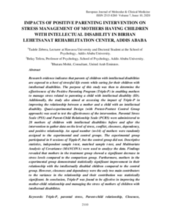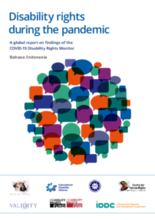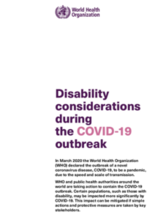Displaying 131 - 140 of 477
In the light of the COVID19 pandemic and with the aim to support a disability-inclusive response to the crisis, International Disability Alliance (IDA) has launched this webpage to share the most recent updates and resources as they become available.
This post from the UNICEF Europe and Central Asia website describes how UNICEF is mobilizing to protect marginalized and vulnerable children – including those with disabilities – against the impact of COVID 19 in the region.
The purpose of this study was to determine the effectiveness of the Positive Parenting Program (Triple-P) in enabling mothers to manage stress related to parenting a child with intellectual disability (ID).
This document is a repository of resources focusing on Covid-19, disability, mental health, chronic health conditions and related topics curated by the International Disability and Development Consortium Inclusive Health Task Group (IDDC IHTG) and the CORE Group Disability Inclusive Health Technical Advisory Group.
This report (translated into Bahasa Indonesia) has one central purpose: To raise the alarm globally as to the catastrophic impact of the COVID-19 pandemic on persons with disabilities worldwide, including children with disabilities, and to catalyse urgent action in the weeks and months to come.
On this page, you will find stories from people with various disabilities across the globe sharing their experiences with the COVID-19 outbreak and pandemic risk reduction strategies implemented by their governments.
This chapter describes a youth-centered approach to transition planning for this vulnerable population and highlights essential elements to consider during the process such as disability, mental health, trauma, resilience, self-determination, culture, and how trauma impacts mental health.
UNICEF has produced a guidance note on considerations for children and adults with disabilities in the COVID-19 response.
This report analyzes data available through the Organization for Economic Cooperation and Development (OECD) Development Assistance Committee (DAC)’s Creditor Reporting System (CRS), which reveals that many mainstream development projects fail to include people with intellectual disabilities, including children. The report includes guidance for ensuring CRPD-compliant project funding, including examples of community living projects that align with the CRPD, such as supporting the transition of people with disabilities from institutions to independent living and providing training for families on supporting their children with disabilities at home.
This briefing from the World Health Organization (WHO) outlines actions for meeting the needs of people with disabilities during the COVID-19 pandemic.





